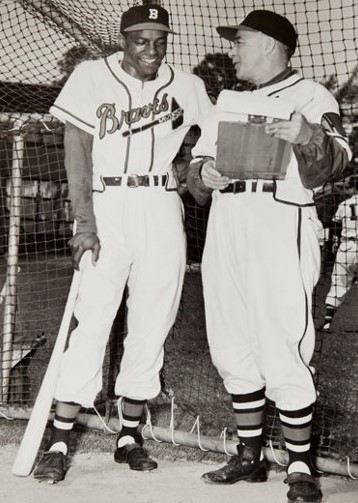On April 16, 1945, 27-year-old Negro League CF Sam Jethroe was invited to Boston to participate in a workout for the Red Sox.
- Jackie Robinson and Marvin Williams were also part of the workout. Jackie said later that Jethroe "looked like a gazelle in the outfield."
- Red Sox coach Hugh Duffy was impressed, but none of the three received an offer from the club. The workout turned out to be a sham as the club had no intention of integrating their roster at that time. They held the tryout in response to pressure from a local city councilman.
- Boston manager Joe Cronin was concerned that the franchise's AAA farm club was in Louisville KY. So, as Sam recalled, "he said we had all the potential, but it wasn't the right time."
- Cronin later explained that "we didn't think they'd be interested in going there (Louisville) because of the racial feelings at that time."
- The three players didn't get upset because they had figured nothing was going to come from the workout anyway.
Jethroe was born in Lowndes County MS but grew up in East St. Louis IL.
- He hitchiked to Sportsman's Park in St. Louis and peeked through a knothole to watch Dizzy Dean and the Cardinals.
- Sam grew up almost next door to future Yankee Hank Bauer. "His backyard touched my backyard, and we'd play games, Hank Bauer's (white) team and my (black) team."
Before and after the Boston workout, Jethroe played eight years in the Negro American League.
- He had an outstanding season in 1942, leading the league in batting average, base hits, runs scored, doubles, triples, and stolen bases. He again topped the NAL in 1944 with a .353 average.
- Sam would have been a welcome addition to any major league team during the talent-depleted war years, but the color barrier prevented it.
- He finally entered "organized ball" in 1948 with AAA Montreal, the same team Robinson started with two years earlier. During spring training in 1949, Jethroe was clocked in a 60y sprint at 5.9 seconds–0.2 seconds faster than the world's record at the time.

Sam Jethroe and Bill Southworth
finally got his big league chance in 1950 with the
Boston Braves.
- He claimed to be 28 but was actually 33.
When Braves manager Billy Southworth found out late in the season his prize rookie's true age, he said, "I don't care if he's 50, just as long as he can do the job."
- Writers observing spring training didn't think Sam could play centerfield for Boston. He "cannot throw with a major league arm" and "cannot field well enough to hold down a vital center field post satisfactorily." He didn't get a good jump on the ball, relying instead on his speed to track it down. He also played deeper than other center fielders, which meant a few balls would drop in front of him that others would have caught.
- But Southworth, an outfielder himself in his playing days, stuck with him.
Sam ignored the criticism and won the 1950 National League Rookie of the Year award.
Sam played three seasons with the Braves.
- When the club moved to Milwaukee in 1953, they optioned Jethroe to Toledo but never recalled him because Billy Bruton took over the centerfield position.
- Sam was traded to the Pirates for the 1954 season but appeared in only two Pittsburgh games–his last in the major leagues.
- He spent his last six seasons in the minors before retiring.
Reference: "Sam Jethroe," Bill Nowlin, sabr.org/bioproj